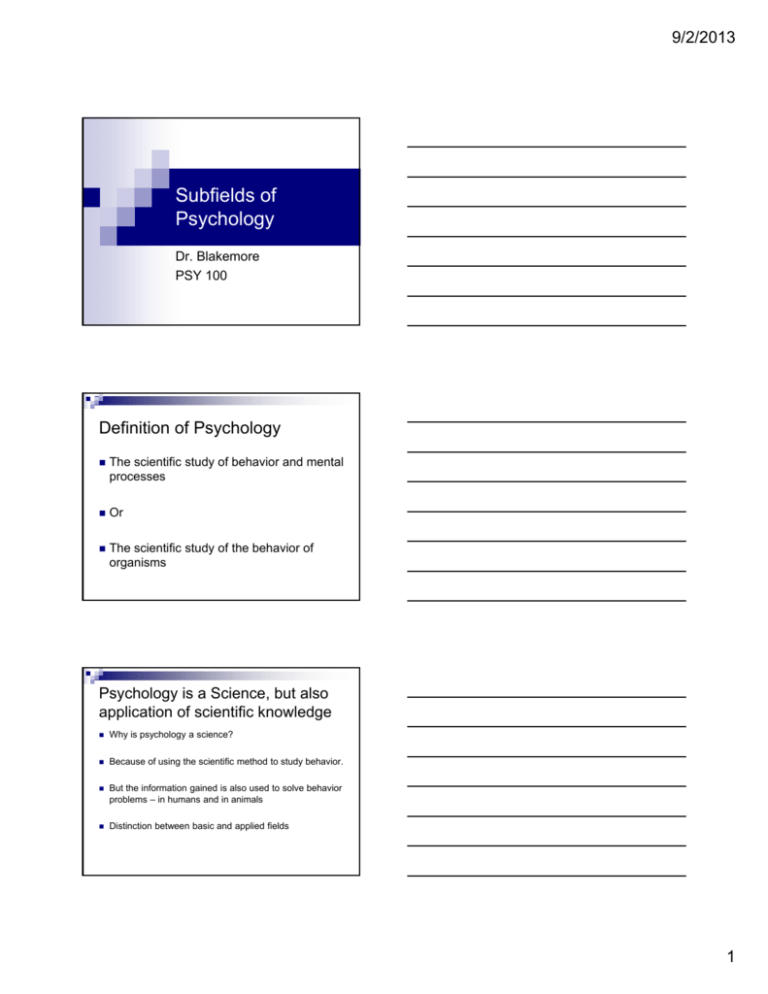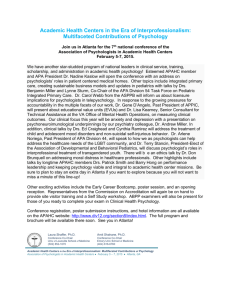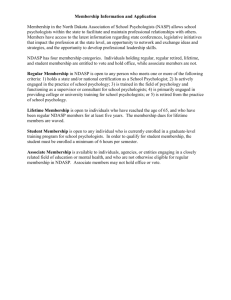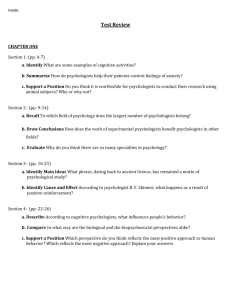Subfields of Psychology
advertisement

9/2/2013 Subfields of Psychology Dr. Blakemore PSY 100 Definition of Psychology The scientific study of behavior and mental processes Or The scientific study of the behavior of organisms Psychology is a Science, but also application of scientific knowledge Why is psychology a science? Because of using the scientific method to study behavior. But the information gained is also used to solve behavior problems – in humans and in animals Distinction between basic and applied fields 1 9/2/2013 Basic Fields The basic fields in psychology are generally concerned with acquiring new knowledge about behavior Doing research People who work in such fields usually work in universities, teaching and doing research, or doing primarily one or the other Or in solely research settings such as The National Institutes of Mental Health Basic Fields Experimental psychologists Behavioral or cognitive neuroscientists or physiological psychologists Cognitive psychologists Psychometric or quantitative psychologists Developmental Psychologists Social Psychologists Applied Fields In the applied fields of psychology, psychologists may also work in universities, teaching and/or doing research, or in completely applied settings Such as business and industry, schools, clinics, hospitals, private practice therapy, the criminal justice system, etc. 2 9/2/2013 Applied Fields, therapy or counseling Clinical Psychologists Clinical neuropsychologists specialize in disorders with a neurological basis, and clinical assessment of those conditions Counseling Psychologists Other applied fields School Psychologists Educational Psychologists (some debate as to whether basic or applied) Human Factors Psychologists Industrial and Organizational Psychologists (I/O) The APA Divisions This gives an excellent idea of the many different domains in psychology www.apa.org/about/division.html 3 9/2/2013 Related Fields Many counselors and therapists are not psychologists Psychiatrists are medical doctors specializing in treatment of mental health conditions Some do research Some do therapy But most prescribe medication for mental health-related conditions Many master’s-level clinicians who are not psychologists Marriage and family counselors Substance abuse or alcohol abuse counselors Licensed mental health counselors MSW (ACSW) social workers Taking an Active Role in your Education Developing skills and special opportunities 4 9/2/2013 Skills you learn in college A college education is more than just your major The reason that certain kinds of employers will hire college graduates as opposed to those who haven’t is generally because of their general skills Especially for a liberal arts degree as opposed to a professional degree What’s the difference? Some examples? General skills with a college degree Oral and written communication Speaking and writing effectively – grammar, correct word usage and spelling are important in the workplace and graduate school Reading skills – to be able to read quickly and comprehend well Language skills will be very important when you take the GRE-V. A great way to boost reading and language skills is to read regularly – even novels, mysteries, but books, magazines and newspapers – more than online sources The ability to listen and summarize what’s being said The ability to work in groups or teams More skills with a college degree The ability to comprehend evidence and arguments The ability to think critically is one of the most important general skills one learns in college Time management Organization Also, very importantly, the use of technology Take the development of these skills very seriously – take every opportunity to improve them Nothing is “busy work” 5 9/2/2013 Academically Adrift http://www.insidehighered.com/news/2011 /01/18/study_finds_large_numbers_of_coll ege_students_don_t_learn_much Psychology in particular Even at the undergraduate level, psychology is especially good at developing Knowledge about people how attitudes develop, what affects children’s development, how to train pets, when to seek mental health help and the value of that help, and many more Library research skills Understanding of the meaning of research findings, and of the need for evidence for any conclusion Critical thinking Data analysis skills Computer and other technological skills Ethical Issues Look in Kuther, Chapter 1 Types of ethical issues For practitioners researchers For students For 6 9/2/2013 Let’s look at CASA http://www.ipfw.edu/casa/ Tutoring, drop in and for particular courses Writing Center Short courses Organizations for Psychology Majors Psychology Club Open to any student interested in psychology Once I find out what they’re doing this semester, I will post to Blackboard Psi Chi The national honor society in Psychology If you are interested in knowing more about them, email psichi@students.ipfw.edu 7







